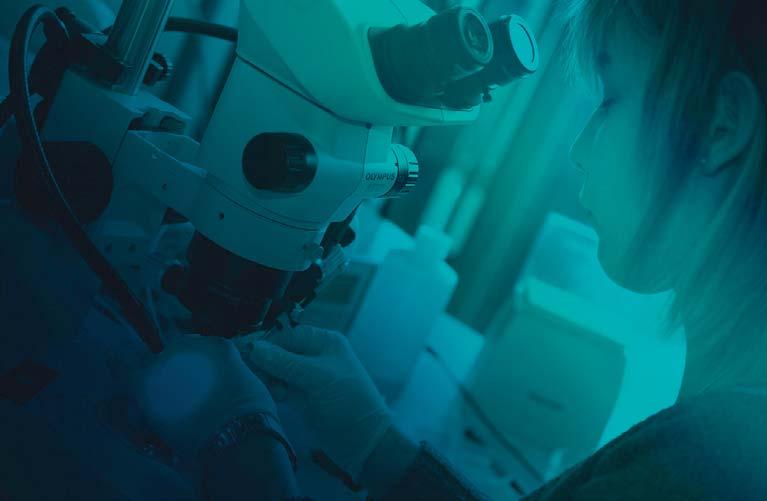UZ Gent A dynamic organisation in full development
P
atients can go there for a full range of highly specialised, high-quality care. The hospital has extensive facilities and more than 1000 beds for one-day and multi-day admissions.
© UZ Gent
© UZ Gent
© UZ Gent
With more than 3,000 patients a day and more than 6,000 employees, Ghent University Hospital is one of the largest and most specialised hospitals in Flanders.
hospitalised patients. A study team led by Dr Marie-Angélique De Scheerder (General Internal Diseases) wants to investigate the effects of the antiviral drug Camostat on a large group of respondents.
Quality customer-friendly service is central to the care provided. As a university centre, UZ Gent also invests in scientific research and training. To this end, the hospital works closely with the Faculty of Medicine and Health Sciences of Ghent University. Doctors and physician-specialists are trained there, and researchers work on new techniques for diagnosis and treatment in numerous services.
Less sick Camostat is already being used in Japan to treat chronic pancreatitis. The drug was found to be safe, but it is not yet on the market with us. However, recent scientific research has shown that it also influences the action of the COVID-19 virus. For example, the drug may be able to alleviate the course of the disease and possibly also reduce the duration and severity of symptoms and infectivity.
The hospital campus is currently undergoing major renovation. The UZ aims to be a modern, accessible and sustainable Health Campus by 2020 that meets the needs of all users.
Subjects sought The UZ Gent is now studying the effects of the medicine when administered in the event of an early COVID infection. The research team is looking for test subjects who have recently been diagnosed and have not been hospitalised.
Scientific spearheads The UZ Gent has pursued a scientific spearhead policy since 2009. Together with UGent's Faculty of Medicine and Health Sciences, four research domains were selected that receive extra funding to further expand their position: oncology, genetics, immunology and neuroscience.
Participants are given a dose of tablets during the initial consultation. They are asked to take this medication for 5 to 10 days. They do not know whether they will be given the study medication or a placebo. Through home monitoring and online questionnaires, all subjects are closely monitored and invited for a new COVID test in the interim. A final consultation at the hospital follows one month after the treatment.
The choice of these four domains was made on the basis of objective criteria: leading position recognised by peers, number of A1 publications, current trends in epidemiology and care needs. The translational character and social valorisation of the research were also decisive factors. The spearhead research should quickly lead to research results that allow patients to be treated better.
For whom? Anyone who took a positive COVID test less than 48 hours ago is eligible for the study. Patients with and without symptoms can participate. Participation, treatment and follow-up are free of charge. Participation is only possible after a positive COVID test has been taken.
Today, UZ Gent already has a leading position in each of these four research domains.
This study was approved by the Medical Ethics Committee of Ghent University Hospital.
Research at UZ Gent is carried out by the Kenniscentrum voor de Gezondheidszorg Gent (KCGG) or Ghent Healthcare Knowledge Centre and the Health, innovation and research institute (HIRUZ) which is structured in 5 units : Clinical Trials Unit, Data Management Unit, Contract Unit, Innovation & Valorisation Unit, and the Biobank.
New search for COVID-19 treatment in non-hospitalised patients On November 11th 2020 UZ Gent started for the first time a study into the effective treatment of a COVID infection in non-
www.uzgent.be 45

















































































































